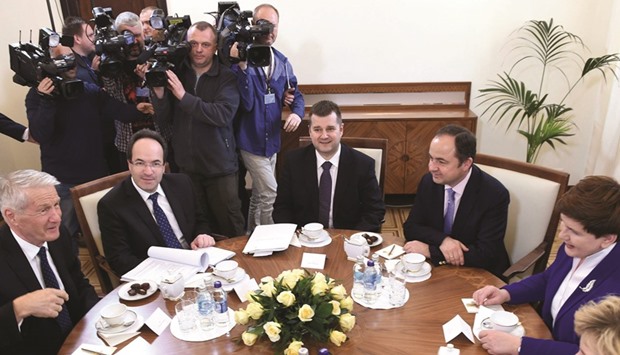European officials are visiting Warsaw this week to discuss allegations of undemocratic behaviour in Poland but seem unlikely to start a row over the migration crisis and the looming vote over Britain’s EU membership.
Since sweeping into power last October, the conservative Law and Justice party (PiS) government has drawn criticism from the European Union and rights’ bodies that its revamp of the country’s top court undermines democratic checks and balances.
Warsaw could face punishment such as the loss of voting rights from the European Union’s executive Commission if Brussels finds it has violated EU standards.
“This is not the time to go to war with Poland,” one EU diplomat told Reuters on condition of anonymity. “My assumption is that everyone will make haste slowly.”
Two other EU diplomats said London and Berlin also wanted the Commission to show restraint.
The eurosceptical PiS government has shown little willingness to compromise over the top court, saying it has a broad mandate to reform key institutions to purge them of post-communist influences.
To prepare for the discussion with Poland’s EU peers expected to start tomorrow, Commission First Vice President Frans Timmermans travels to Warsaw today.
Yesterday, Thorbjoern Jagland, the head of the 47-nation Council of Europe which promotes democracy in Europe, was in Poland for talks likely to influence the Commission.
The EU stood by largely powerless to stop Hungary’s Viktor Orban when he challenged democratic norms like the independence of courts and media after taking office in 2010. Hungary has also signalled it would block any attempts to sanction Poland.
Underlining the extent of international concern over Poland, which is due to host a summit of Nato leaders in July, Washington has also sent senior officials in recent months to discuss the constitutional court revamp.
But diplomats say the US, Poland’s traditional key ally, is not likely not confront Warsaw openly a time of Russia’s renewed assertiveness in eastern Europe.
Domestically, public opinion polls show PiS’ popularity remains largely stable despite protests and scathing criticism in independent media. Some polls show it at just under 40%, close to its election score.
Since coming to power, PiS has strengthened its grip on Poland’s key institutions, including the secret services and public media, and expanded state surveillance powers.
Critics say the top court revamp cripples its ability to review and rule on legislation. The court itself has refused to implement the new rules, setting off a constitutional crisis.
Experts say a mix of economic giveaways and nationalist rhetoric cements the government’s popularity.
This underscores a deepening polarisation between the urban, liberal middle class and the poorer, the elderly and the inhabitants of smaller towns who welcome the government’s promise of more economic equality and national pride.
On Friday, the government launched a large-scale child benefit scheme worth an estimated 17bn zlotys this year. It will see parents of at least two children receive over 100 euros per month, with more money for every additional child.
“Most Poles don’t even understand what the constitutional court crisis is all about, but they will understand the 1,000 zlotys in their bank account,” a senior government official told Reuters, speaking on condition of anonymity.
Rafal Chwedoruk, a Warsaw University political scientist, said he saw “absolutely no risks” in the short-term for PiS, adding that lowering the retirement age next year, another election pledge, would likely secure it another term.
The party, which is run by Jaroslaw Kaczynski, the twin brother of late President Lech Kaczynski, appears united despite the pressure, squashing any talk of early election.
While certain new backbenchers may be a little concerned by the depth of state reform, “there are no visible cracks” in the ruling party’s structure, the senior official said.

Secretary General of the Council of Europe Thornbjorn Jagland (left) holds talks with Polish Prime Minister Beata Szydlo in Warsaw yesterday.
